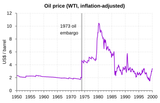Anonymous
ID: JtxpQPjh
6/15/2025, 11:18:48 PM No.507516772
>The Great Divergence or European miracle is the socioeconomic shift in which the Western world (i.e. Western Europe along with its settler offshoots in Northern America and Australasia) overcame pre-modern growth constraints and emerged during the 19th century as the most powerful and wealthy world civilizations, eclipsing previously dominant or comparable civilizations from Asia such as Qing China, Mughal India, the Ottoman Empire, Safavid Iran, and Tokugawa Japan, among others
>Scholars have proposed a wide variety of theories to explain why the Great Divergence happened, including geography, culture, institutions, and luck. There is disagreement over the nomenclature of the "great" divergence, as a clear point of beginning of a divergence is traditionally held to be the 16th or even the 15th century, with the Commercial Revolution and the origins of mercantilism and capitalism during the Renaissance and the Age of Discovery, the rise of the European colonial empires, proto-globalization, the Scientific Revolution, or the Age of Enlightenment. Yet the largest jump in the divergence happened in the late 18th and 19th centuries with the Industrial Revolution and Technological Revolution. For this reason, the "California school" considers only this to be the great divergence
>Technological advances, in areas such as transportation, mining, and agriculture, were embraced to a higher degree in western Eurasia than the east during the Great Divergence. Technology led to increased industrialization and economic complexity in the areas of agriculture, trade, fuel, and resources, further separating east and west. Western Europe's use of coal as an energy substitute for wood in the mid-19th century gave it a major head start in modern energy production
>Scholars have proposed a wide variety of theories to explain why the Great Divergence happened, including geography, culture, institutions, and luck. There is disagreement over the nomenclature of the "great" divergence, as a clear point of beginning of a divergence is traditionally held to be the 16th or even the 15th century, with the Commercial Revolution and the origins of mercantilism and capitalism during the Renaissance and the Age of Discovery, the rise of the European colonial empires, proto-globalization, the Scientific Revolution, or the Age of Enlightenment. Yet the largest jump in the divergence happened in the late 18th and 19th centuries with the Industrial Revolution and Technological Revolution. For this reason, the "California school" considers only this to be the great divergence
>Technological advances, in areas such as transportation, mining, and agriculture, were embraced to a higher degree in western Eurasia than the east during the Great Divergence. Technology led to increased industrialization and economic complexity in the areas of agriculture, trade, fuel, and resources, further separating east and west. Western Europe's use of coal as an energy substitute for wood in the mid-19th century gave it a major head start in modern energy production


